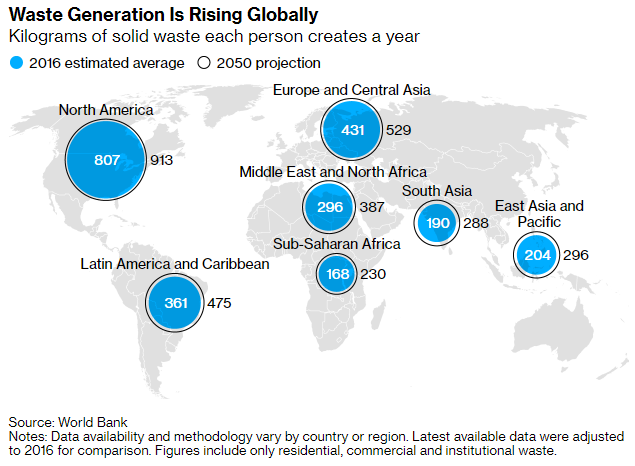by Julia Masters
For many people in the United States, recycling is second nature. It plays a crucial role in minimizing waste and preserving natural resources in the age of extraction and production. In many cities, like New York, San Diego, Pittsburgh, and Seattle, recycling is mandated - and apartment buildings, office spaces, and restaurants can face fines if they don’t recycle plastics, cans, cardboard, and glass. It’s even trendy, as promoted by brands like Sweetgreen and H&M, and widely accepted as a more eco-friendly option to throwing out trash. But is that the truth?
The reality about our massive, complex recycling system is far bleaker. For almost three decades, the U.S. and a host of other countries have shunted their plastic trash onto Asian countries, despite many of those developing nations lacking the capacity to manage such waste. Since 1992, China has imported 106 million metric tons of plastic.
Image: Bloomberg.
Last year, in an effort to crack down on increasingly worsening pollution, China stopped accepting foreign recyclables. With that, two bold patterns have become apparent. First, it has dispelled the notion that all the disposable plastic we put in our recycling bin is actually being recycled. For Americans, it has seemingly become cheaper and less onerous to compact unwanted plastic into bales and ship it across oceans than to transport it domestically by rail or truck. Doesn’t seem very eco-conscious, does it? The second truth that has become clear is that the world’s recycling networks need a massive overhaul. The University of Georgia has estimated that China’s ban on imported recyclables will leave 111 million metric tons of trash from around the world with nowhere to go by 2030 if we keep consuming and producing waste at the same rate we do today. But we don’t have to wait years to see this looming problem come to fruition!
The burden of recycling now falls regionally, on municipalities. Rather than be able to ship out any and all recycling overseas, these municipalities now have two choices: pay much higher rates to get rid of recycling, or throw it all away. This has shifted the conversation over recycling; “recycling everything you can” is now a monetary and an environmental burden.
The first cost, financial, has been burdensome for every single state. WasteDive, an industry website that covers waste management, has kept a timeline of how the Chinese recycling ban is affecting the U.S. Some cities are scrapping curbside recycling pickup and many urban recycling centers all across the country are closing as well.
The environmental predicament is no simpler. When organic waste sits in a landfill, it decomposes, emitting methane (which is bad for the climate and 84 times more potent than carbon dioxide!). In fact, landfills are the third largest source of methane emissions in the country. In addition, burning plastic for recycling purposes (which many places do!) creates some energy, but also creates carbon emissions and has damaging off gassing. Proponents of burning plastic as a sustainable method back up their assertion that cutting-edge technology can limit the harmful chemicals that burning plastic emits. Opponents to this practice boast that the methane from landfills can be collected as biogas and burned for power. There is no easy solution to our ever-expanding waste problem.
Recycling habits will continue to shift more as these constraints play out in budgeting plans and environmental protections. No longer will a toothpaste tube or a plastic bottle seem like a wasteless purchase when there is a recycling bin nearby — waste needs to go somewhere, and our habits need to shift.
While the recycling conundrum will be a challenge over the coming months and years, there is still something we consumers can do to alleviate the problem. We can consume less. It's a win for the environment and a win for our wallets. We can buy things with less packaging and buy less online (which often has a lot of packaging- ahem, Amazon!), and help cut back on the amount of stuff that needs to be recycled in the first place!
Have any ideas for what you can do to spark bigger change? Leave us a comment.


